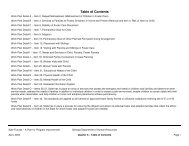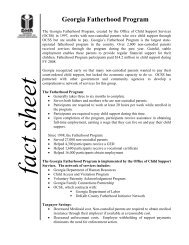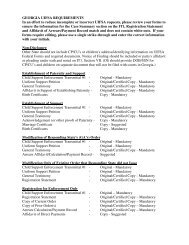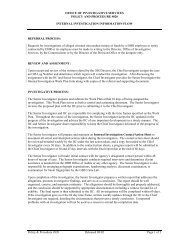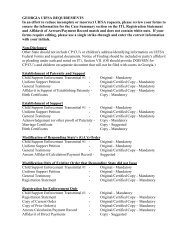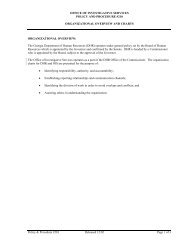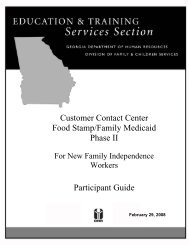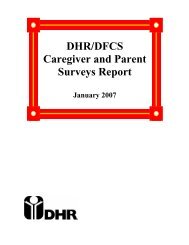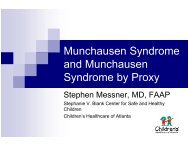an overview georgia program improvement plan - Department of ...
an overview georgia program improvement plan - Department of ...
an overview georgia program improvement plan - Department of ...
You also want an ePaper? Increase the reach of your titles
YUMPU automatically turns print PDFs into web optimized ePapers that Google loves.
Since SFY 1999 approximately 23,000 children have received FP/BP assessments. In SFY 2004 $11.5 million was expended on FP/BP assessments <strong>an</strong>d $16 million was expended<br />
on Wrap Around services to support FP/BP recommendations. The FP/BP M<strong>an</strong>ual <strong>an</strong>d the Georgia Family Conferencing M<strong>an</strong>ual are a part <strong>of</strong> the 8 th quarterly report in the<br />
Documentation Appendix.<br />
3. Georgia far exceeded its goal <strong>of</strong> developing five visitation centers throughout the state. Currently, there are 25 Promoting Safe <strong>an</strong>d Stable Families (PSSF) funded visitation<br />
centers in Georgia. Additionally, the state supports the Georgia Presbytery efforts to establish visitation centers in their churches throughout the state. These centers, called "Safe<br />
Havens for Children" have identified coordinators in respective Presbyteries who provide information <strong>an</strong>d help to get the local church visitation center established. Mr. Billy<br />
Payne, who spearheaded the 1996 Centennial Olympic Games in Atl<strong>an</strong>ta, is co-sponsoring this effort via the Georgia Presbytery.<br />
4. To help improve the state's outcomes for child safety, perm<strong>an</strong>ence <strong>an</strong>d well-being, signific<strong>an</strong>t policy <strong>an</strong>d training revisions have occurred since the federal on-site review in July<br />
2001. Social Services M<strong>an</strong>ual Tr<strong>an</strong>smittal No. 03-01 was developed <strong>an</strong>d released in April 2003 to specifically address "areas needing <strong>improvement</strong>" as outlined in the Federal<br />
Final Report to Georgia. The policy includes instructions <strong>an</strong>d good practice issues regarding family assessments; clarity on perm<strong>an</strong>ency pl<strong>an</strong>ning options <strong>an</strong>d the criteria for their<br />
appropriate selection; exp<strong>an</strong>sion on the need for a closer working relationship with the parent <strong>of</strong> a child whose perm<strong>an</strong>ency pl<strong>an</strong> (or concurrent pl<strong>an</strong>) is reunification; new monthly<br />
contact st<strong>an</strong>dards in the least restrictive environment to expedite perm<strong>an</strong>ency for children whose pl<strong>an</strong> is TPR <strong>an</strong>d place for adoption. A Termination Packet was developed <strong>an</strong>d<br />
released to the county departments <strong>an</strong>d SAAGS. The policy incorporates the packet as <strong>an</strong> Addendum to the m<strong>an</strong>ual's Legal Services Section <strong>an</strong>d provides required time frames for<br />
completion <strong>an</strong>d submission to the SAAG. Social Services M<strong>an</strong>ual Tr<strong>an</strong>smittal No. 03-01 is a part <strong>of</strong> the 8 th quarterly reporting Documentation Appendix for Item 7, action step<br />
D6.<br />
5. Foster parents play a vital role in Georgia 's efforts to care for children. Central to these efforts is the partnership between the Division <strong>of</strong> Family <strong>an</strong>d Children Services <strong>an</strong>d<br />
foster parents. The Foster Parent Bill <strong>of</strong> Rights, which was signed into law by Governor Sonny Perdue on May 5, 2004 during Georgia’s recognition <strong>of</strong> National Foster Care<br />
Month, strengthens this partnership <strong>an</strong>d supports the work <strong>of</strong> foster parents. Georgia’s bill is a trailblazer; Georgia is one <strong>of</strong> only nine states with a codified Bill <strong>of</strong> Rights for its<br />
foster parents. Georgia’s Bill <strong>of</strong> Rights <strong>of</strong>ficially became law on July 1, 2004. The twenty-three rights include issues such as non-discrimination, distribution <strong>an</strong>d disclosure <strong>of</strong><br />
information, fin<strong>an</strong>cial reimbursement <strong>an</strong>d the right to have input into case pl<strong>an</strong>ning for children. The Bill also provided that a new griev<strong>an</strong>ce procedure be established to address<br />
<strong>an</strong>y violations. The three-step process begins at the county level <strong>an</strong>d proceeds if necessary to a state mediation committee consisting <strong>of</strong> representatives from DFCS, the Adoptive<br />
<strong>an</strong>d Foster Parent Association <strong>of</strong> Georgia <strong>an</strong>d the Office <strong>of</strong> the Child Advocate.<br />
KEY PIP RESULTS RELATING TO SAFETY, PERMANENCY, AND WELL BEING<br />
Safety Outcome 1, Children are First <strong>an</strong>d Foremost Protected from Abuse <strong>an</strong>d Neglect<br />
Safe Futures – A Pl<strong>an</strong> for Program Improvement<br />
Georgia <strong>Department</strong> <strong>of</strong> Hum<strong>an</strong> Resources<br />
November, 2004 Quarter 8 – Table <strong>of</strong> Contents Page ii




